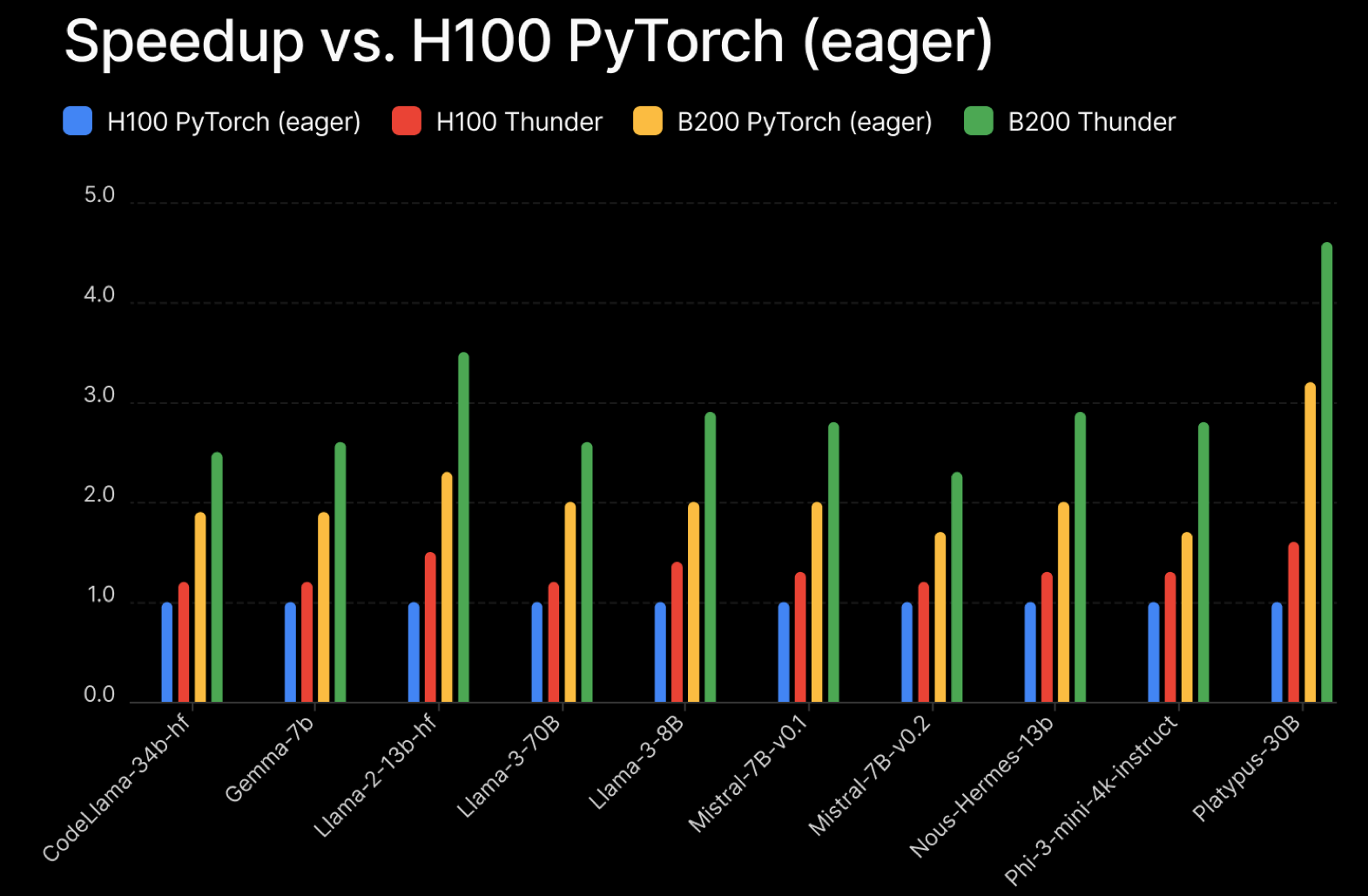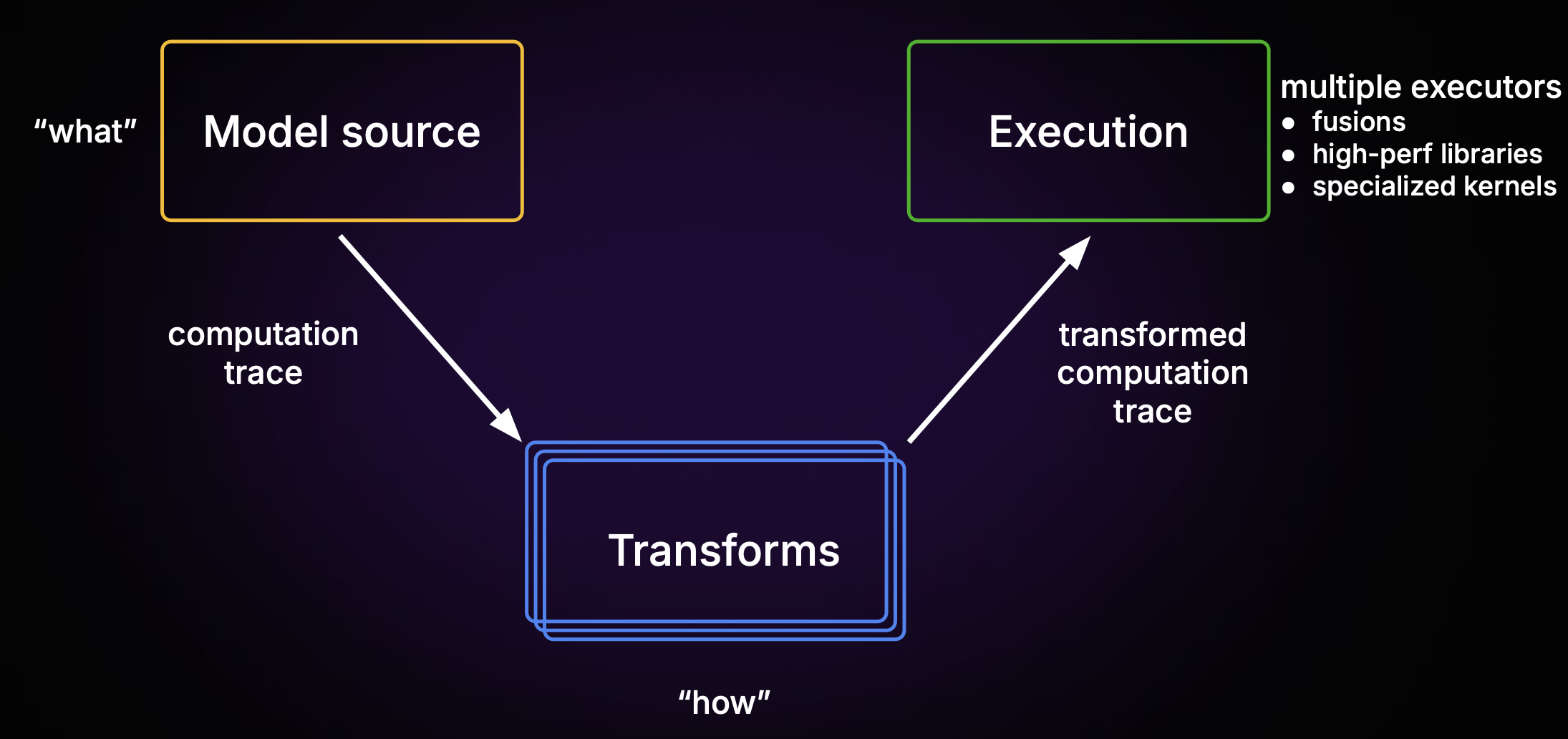Lightning Thunder is a source-to-source compiler for PyTorch, enabling PyTorch programs to run on different hardware accelerators and graph compilers.
Project description
Give your PyTorch models superpowers ⚡


Source-to-source compiler for PyTorch. Understandable. Inspectable. Extensible.
✅ Run PyTorch 40% faster ✅ Quantization ✅ Kernel fusion ✅ Training recipes ✅ FP4/FP6/FP8 precision ✅ Distributed TP/PP/DP ✅ Inference recipes ✅ Ready for NVIDIA Blackwell ✅ CUDA Graphs ✅ LLMs, non LLMs and more ✅ Custom Triton kernels ✅ Compose all the above
Thunder is a source-to-source deep learning compiler for PyTorch that focuses on making it simple to optimize models for training and inference.
It provides:
- a simple, Pythonic IR capturing the entire computation
- a rich system of transforms that simultaneously operate on the computation IR, the model, and the weights
- an extensible dispatch mechanism to fusers and optimized kernel libraries
With Thunder you can:
- profile deep learning programs easily, map individual ops to kernels and inspect programs interactively
- programmatically replace sequences of operations with optimized ones and see the effect on performance
- acquire full computation graphs without graph breaks by flexibly extending the interpreter
- modify programs to fully utilize bleeding edge kernel libraries on specific hardware
- write models for single GPU and transform them to run distributed
- quickly iterate on mixed precision and quantization strategies to search for combinations that minimally affect quality
- bundle all optimizations in composable recipes, so they can be ported across model families
Ultimately, you should think about Thunder as a highly efficient tool to go from “unoptimized” to “optimized”.
If that is of interest for you, read on to Install Thunder and get started quickly.

Quick start
Install Thunder via pip (more options):
pip install lightning-thunder
pip install -U torch torchvision
pip install nvfuser-cu128-torch28 nvidia-cudnn-frontend # if NVIDIA GPU is present
For older versions of torch
torch==2.7 + CUDA 12.8
pip install lightning-thunder
pip install torch==2.7.0 torchvision==0.22
pip install nvfuser-cu128-torch27 nvidia-cudnn-frontend # if NVIDIA GPU is present
torch==2.6 + CUDA 12.6
pip install lightning-thunder
pip install torch==2.6.0 torchvision==0.21
pip install nvfuser-cu126-torch26 nvidia-cudnn-frontend # if NVIDIA GPU is present
torch==2.5 + CUDA 12.4
pip install lightning-thunder
pip install torch==2.5.0 torchvision==0.20
pip install nvfuser-cu124-torch25 nvidia-cudnn-frontend # if NVIDIA GPU is present
Advanced install options
Install optional executors
# Float8 support (this will compile from source, be patient)
pip install "transformer_engine[pytorch]"
Install Thunder bleeding edge
pip install git+https://github.com/Lightning-AI/lightning-thunder.git@main
Install Thunder for development
git clone https://github.com/Lightning-AI/lightning-thunder.git
cd lightning-thunder
pip install -e .
Hello world
Define a function or a torch module:
import torch.nn as nn
model = nn.Sequential(nn.Linear(2048, 4096), nn.ReLU(), nn.Linear(4096, 64))
Optimize it with Thunder:
import thunder
import torch
thunder_model = thunder.compile(model)
x = torch.randn(64, 2048)
y = thunder_model(x)
torch.testing.assert_close(y, model(x))
Examples
LLM training
Install LitGPT (without updating other dependencies)
pip install --no-deps 'litgpt[all]'
and run
import thunder
import torch
import litgpt
with torch.device("cuda"):
model = litgpt.GPT.from_name("Llama-3.2-1B").to(torch.bfloat16)
thunder_model = thunder.compile(model)
inp = torch.ones((1, 2048), device="cuda", dtype=torch.int64)
out = thunder_model(inp)
out.sum().backward()
HuggingFace BERT inference
Install Hugging Face Transformers (recommended version is 4.50.2 and above)
pip install -U transformers
and run
import thunder
import torch
import transformers
model_name = "bert-large-uncased"
tokenizer = transformers.AutoTokenizer.from_pretrained(model_name)
with torch.device("cuda"):
model = transformers.AutoModelForCausalLM.from_pretrained(
model_name, torch_dtype=torch.bfloat16
)
model.requires_grad_(False)
model.eval()
inp = tokenizer(["Hello world!"], return_tensors="pt")
thunder_model = thunder.compile(model)
out = thunder_model(**inp)
print(out)
HuggingFace DeepSeek R1 distill inference
Install Hugging Face Transformers (recommended version is 4.50.2 and above)
pip install -U transformers
and run
import torch
import transformers
import thunder
model_name = "deepseek-ai/DeepSeek-R1-Distill-Llama-8B"
tokenizer = transformers.AutoTokenizer.from_pretrained(model_name)
with torch.device("cuda"):
model = transformers.AutoModelForCausalLM.from_pretrained(
model_name, torch_dtype=torch.bfloat16
)
model.requires_grad_(False)
model.eval()
inp = tokenizer(["Hello world! Here's a long story"], return_tensors="pt")
thunder_model = thunder.compile(model)
out = thunder_model.generate(
**inp, do_sample=False, cache_implementation="static", max_new_tokens=100
)
print(out)
Vision Transformer inference
import thunder
import torch
import torchvision as tv
with torch.device("cuda"):
model = tv.models.vit_b_16()
model.requires_grad_(False)
model.eval()
inp = torch.randn(128, 3, 224, 224)
out = model(inp)
thunder_model = thunder.compile(model)
out = thunder_model(inp)
Benchmarks
Although is Thunder a tool for optimizing models, rather than an opaque compiler that gets you speedups out of the box, here is a set of benchmarks.
Perf-wise, out of the box Thunder is in the ballpark of torch compile, especially when using CUDAGraphs. Note however that Thunder is not a competitor to torch compile! It can actually use torch compile as one of its fusion executors.
The script examples/quickstart/hf_llm.py demonstrates how to benchmark a model for text generation, forward pass, forward pass with loss, and a full forward + backward computation.
On an H100 with torch=2.8.0 and nvfuser-cu128-torch28 and Transformers 4.55.4 running Llama 3.2 1B we see the following timings:
Transformers with torch.compile and CUDAGraphs (reduce-overhead mode): 521ms
Transformers with torch.compile but no CUDAGraphs (default mode): 814ms
Transformers without torch.compile: 1493ms
Thunder with CUDAGraphs: 542ms
Plugins
Plugins are a way to apply optimizations to a model, such as parallelism and quantization.
Thunder comes with a few plugins included of the box, but it's easy to write new ones.
- scale up with distributed strategies with DDP, FSDP, TP ()
- optimize numerical precision with FP8, MXFP8
- save memory with quantization
- reduce latency with CUDAGraphs
- debugging and profiling
For example, in order to reduce CPU overheads via CUDAGraphs you can add "reduce-overhead"
to the plugins= argument of thunder.compile:
thunder_model = thunder.compile(model, plugins="reduce-overhead")
This may or may not make a big difference. The point of Thunder is that you can easily swap optimizations in and out and explore the best combination for your setup.
How it works
Thunder works in three stages:
-
⚡️ It acquires your model by interpreting Python bytecode and producing a straight-line Python program
-
️⚡️ It transforms the model and computation trace to make it distributed, change precision
-
⚡️ It routes parts of the trace for execution
- fusion (
NVFuser,torch.compile) - specialized libraries (e.g.
cuDNN SDPA,TransformerEngine) - custom Triton and CUDA kernels
- PyTorch eager operations
- fusion (

This is how the trace looks like for a simple MLP:
import thunder
import torch
import torch.nn as nn
model = nn.Sequential(nn.Linear(1024, 2048), nn.ReLU(), nn.Linear(2048, 256))
thunder_model = thunder.compile(model)
y = thunder_model(torch.randn(4, 1024))
print(thunder.last_traces(thunder_model)[-1])
This is the acquired trace, ready to be transformed and executed:
def computation(input, t_0_bias, t_0_weight, t_2_bias, t_2_weight):
# input: "cuda:0 f32[4, 1024]"
# t_0_bias: "cuda:0 f32[2048]"
# t_0_weight: "cuda:0 f32[2048, 1024]"
# t_2_bias: "cuda:0 f32[256]"
# t_2_weight: "cuda:0 f32[256, 2048]"
t3 = ltorch.linear(input, t_0_weight, t_0_bias) # t3: "cuda:0 f32[4, 2048]"
t6 = ltorch.relu(t3, False) # t6: "cuda:0 f32[4, 2048]"
t10 = ltorch.linear(t6, t_2_weight, t_2_bias) # t10: "cuda:0 f32[4, 256]"
return (t10,)
Note how Thunder's intermediate representation is just (a subset of) Python!
Performance
Thunder is fast. Here are the speed-ups obtained on a pre-training task using LitGPT on H100 and B200 hardware, relative to PyTorch eager.

Community
Thunder is an open source project, developed in collaboration with the community with significant contributions from NVIDIA.
Project details
Release history Release notifications | RSS feed
Download files
Download the file for your platform. If you're not sure which to choose, learn more about installing packages.
Source Distribution
Built Distribution
Filter files by name, interpreter, ABI, and platform.
If you're not sure about the file name format, learn more about wheel file names.
Copy a direct link to the current filters
File details
Details for the file lightning_thunder-0.2.6.tar.gz.
File metadata
- Download URL: lightning_thunder-0.2.6.tar.gz
- Upload date:
- Size: 637.0 kB
- Tags: Source
- Uploaded using Trusted Publishing? No
- Uploaded via: twine/6.1.0 CPython/3.13.7
File hashes
| Algorithm | Hash digest | |
|---|---|---|
| SHA256 |
74897156457a505d694fa8a79c0e1e99dbb17ad3b4f62a940a472c567d7e2e15
|
|
| MD5 |
6b7830799ace14172415b0aaf46496e8
|
|
| BLAKE2b-256 |
0ac722602c16fd65e4ed4c4e02031d4cceed2088e2987546c80ea112abd6b550
|
File details
Details for the file lightning_thunder-0.2.6-py3-none-any.whl.
File metadata
- Download URL: lightning_thunder-0.2.6-py3-none-any.whl
- Upload date:
- Size: 997.5 kB
- Tags: Python 3
- Uploaded using Trusted Publishing? No
- Uploaded via: twine/6.1.0 CPython/3.13.7
File hashes
| Algorithm | Hash digest | |
|---|---|---|
| SHA256 |
7b0bb904e5a162b0a2b762ce4652e1ad993b467f45f714b159b78d3bc94e2b9c
|
|
| MD5 |
9422f94f875991d9cbbd88fff2c305d6
|
|
| BLAKE2b-256 |
65d8dfff5fee348b34c2295c872977fc1a819ffba930b557c4d3eb3a9a38e85d
|

















